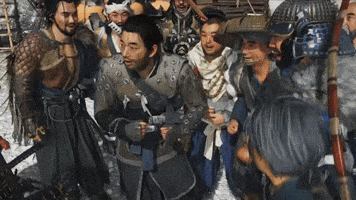cormack12
Gold Member
Source: https://www.theguardian.com/games/2...tei-preview-tsushima-sucker-punch-productions
As the game's co-director Nate Fox puts it, "Atsu is not somebody who walks in to a room and people pay respect to."
If Ghost of Tsushima is about a man grappling with the trade of one kind of power for another, Yōtei sees Atsu seize the only power she can with both hands.
"She has a different life than Jin, and we want to bring that out through interactivity," Fox says. That means removing Ghost of Tsushima's contemplative moments, such as those during which Jin would meditate on his surroundings and transform his struggle into haiku. "Jin was a scholarly samurai; he would pause to reflect and take in the beauty of nature. Atsu is not that person." Those moments softened the rough edges of Tsushima, a mellowing that Sucker Punch doesn't want to apply to the feral world of Yōtei. Atsu doesn't write poems; she collects bounties as she hunts down the warriors that stalk Hokkaido.
"We like creating features that are tonally supportive," Yōtei's other game director, Jason Connell, says. "Camping is something you would expect in a world like this." And Fox adds, "Atsu's a sellsword used to sleeping rough".
As game worlds have expanded and the numbers of questlines and upgrade trees have multiplied, it has created a barrier of administration between players and the worlds they're exploring. Instead of moving on foot, they use fast travel to warp between markers on the map. "It's discordant," Connell says. One moment you might be in a tropical forest fighting mercenaries, the next you're on a mountaintop upgrading a weapon before hopping to a beach to deliver a quest item. Atsu's camp is Sucker Punch's attempt to redress this disruption and wrap the world around the player. Quest givers, shopkeepers and key characters will now visit you, providing a way to continue your journey without interrupting the flow of the story. "It's a convenience," Connell says, "and a more diegetic experience."
As the game's co-director Nate Fox puts it, "Atsu is not somebody who walks in to a room and people pay respect to."
If Ghost of Tsushima is about a man grappling with the trade of one kind of power for another, Yōtei sees Atsu seize the only power she can with both hands.
"She has a different life than Jin, and we want to bring that out through interactivity," Fox says. That means removing Ghost of Tsushima's contemplative moments, such as those during which Jin would meditate on his surroundings and transform his struggle into haiku. "Jin was a scholarly samurai; he would pause to reflect and take in the beauty of nature. Atsu is not that person." Those moments softened the rough edges of Tsushima, a mellowing that Sucker Punch doesn't want to apply to the feral world of Yōtei. Atsu doesn't write poems; she collects bounties as she hunts down the warriors that stalk Hokkaido.
"We like creating features that are tonally supportive," Yōtei's other game director, Jason Connell, says. "Camping is something you would expect in a world like this." And Fox adds, "Atsu's a sellsword used to sleeping rough".
As game worlds have expanded and the numbers of questlines and upgrade trees have multiplied, it has created a barrier of administration between players and the worlds they're exploring. Instead of moving on foot, they use fast travel to warp between markers on the map. "It's discordant," Connell says. One moment you might be in a tropical forest fighting mercenaries, the next you're on a mountaintop upgrading a weapon before hopping to a beach to deliver a quest item. Atsu's camp is Sucker Punch's attempt to redress this disruption and wrap the world around the player. Quest givers, shopkeepers and key characters will now visit you, providing a way to continue your journey without interrupting the flow of the story. "It's a convenience," Connell says, "and a more diegetic experience."






